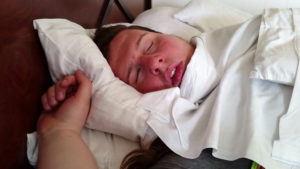There’s a really good chance that you or someone you know—perhaps even live with—snores during their sleep. That’s because over half of all American’s do. While we may think of it as a mere annoyance, snoring could be a potential danger, as it sometimes serves as the first warning sign of obstructive sleep apnea, or OSA. Even if things aren’t so dire, it’s usually a sign of low quality sleep, which is to say nothing of how it impacts the sleep of those nearby. In this article, we have listed 10 Natural Remedies to help stop Snoring.
 But are there natural ways to remedy snoring? Not only is the answer a resounding “yes,” but you should pursue these natural approaches before purchasing any over the counter medications or treatments. Ultimately, your primary care provider should always have the final say, but effective natural techniques are simple, ranging from changing your posture to altering your diet. They are a matter of proven, observable science.
But are there natural ways to remedy snoring? Not only is the answer a resounding “yes,” but you should pursue these natural approaches before purchasing any over the counter medications or treatments. Ultimately, your primary care provider should always have the final say, but effective natural techniques are simple, ranging from changing your posture to altering your diet. They are a matter of proven, observable science.
Please understand that when we describe these methods as “natural,” we are not talking about homeopathy. While there are many who sing the praises of homeopathic remedies, for the purposes of this article we are focused solely on methods with demonstrable results.
That said if you’d like to learn some of the easiest ways you can naturally put the kibosh on snoring, read on below.
1. Sleep on your side.
 Snoring is the result of restricted or obstructed airflow. When you sleep on your back with your face towards the ceiling, you are allowing your tongue to reposition itself towards the back of your throat, becoming an obstacle of easy airflow. With that being the case, it’s no wonder that most back sleepers snore.
Snoring is the result of restricted or obstructed airflow. When you sleep on your back with your face towards the ceiling, you are allowing your tongue to reposition itself towards the back of your throat, becoming an obstacle of easy airflow. With that being the case, it’s no wonder that most back sleepers snore.
When you first talk to your primary care provider about snoring issues, one of their recommendations will likely be that you start sleeping on your side. This prevents your tongue from moving in a way that will hinder your breathing. In situations where the source of snoring isn’t medical, this change is often enough to stop the problem in its tracks.
However, not everyone can easily adapt to changing sleep positions. Most of us have a preferred way that we sleep, and everything else can feel unfamiliar to the point of keeping us awake at night. It may take some time to get used to, but if you struggle to adapt (or if you shift about in your sleep), an adjustable mattress that props you into a seated incline position can have the same results.
2. Avoid alcohol before bed.
 Alcohol is a depressant, and as such it induces a feeling of sleepiness in some. Some people will drink before bed as a means to get into a more relaxed state. The problem, though, is that alcohol relaxes muscles throughout your body, including the muscles located in the back of your throat. Snoring takes place if these same muscles become too relaxed.
Alcohol is a depressant, and as such it induces a feeling of sleepiness in some. Some people will drink before bed as a means to get into a more relaxed state. The problem, though, is that alcohol relaxes muscles throughout your body, including the muscles located in the back of your throat. Snoring takes place if these same muscles become too relaxed.
Alcohol intake before slinking off to sleep is already a dangerous prospect, so it should be avoided whenever possible. But you may be wondering how close to bedtime is too close? Since alcohol’s impact varies from person to person, there’s no general consensus on what makes a safe buffer, with most estimates ranging from two to five hours before hitting the hay. The more time you put between the last drink you had and when you sleep, the less likely your throat muscles are to slack off.
There’s another, more indirect way that alcohol can lead to snoring. Though it may, at first, feel as though it’s helping to induce a sleep state, alcohol itself can interfere with the quality of your sleep. A shallow sleep, where you’re lingering between deep restorative sleep and being awake, can strain several sleep functions, including smooth breathing.
3. Quit sedatives.
 Medications that qualify as sedatives have a similar muscle-relaxing effect as alcohol, but which medicines are sedatives isn’t always obvious. We recognize sleep aids and pain killers as such, but antidepressants, anti-anxiety, and allergy meds, just as examples, can cause muscle relaxation. Sedatives can be found in over the counter medicines as well as prescriptions.
Medications that qualify as sedatives have a similar muscle-relaxing effect as alcohol, but which medicines are sedatives isn’t always obvious. We recognize sleep aids and pain killers as such, but antidepressants, anti-anxiety, and allergy meds, just as examples, can cause muscle relaxation. Sedatives can be found in over the counter medicines as well as prescriptions.
If you elect to take such medications without a prescription, simply quitting them could be enough to curb snoring. If it’s something that you’re prescribed, however, or that you feel you need, talk to your primary care provider before stopping any medications. They can help you find alternatives for any necessary medications that may act as sedatives.
If what you take is a sleep aid, you may not need to replace it with another medication. Instead, developing better sleep practices and sleep hygiene could help you nod off faster. In fact, doing so may be better for you in the long run: you’ll avoid developing a dependency on sleep aids or building up a tolerance against them.
4. Eat a smaller dinner.
 From a very young age, we’re made to understand that certain foods before bed are a big no-no. We’re taught to avoid sugary foods and caffeine at night, but there are other, more complex factors that sometimes go unexplained. One of those is the size of the meal.
From a very young age, we’re made to understand that certain foods before bed are a big no-no. We’re taught to avoid sugary foods and caffeine at night, but there are other, more complex factors that sometimes go unexplained. One of those is the size of the meal.
A large meal, regardless of what it is, can cause snoring in two ways. First, a full stomach impedes your breathing somewhat. This is because your stomach and small intestine are in very close proximity to your diaphragm and lungs, and as one expands it takes space away from the others. Second, a larger meal increases the risk of acid reflux, which contributes to the severity of snoring.
Reducing the size of your meal is the best way to avoid these problems. However, you should look at what you’re eating as well. Dairy, in particular, can make things worse for snorers: your body produces more mucus in response to consuming dairy, and the mucus is thicker. While this is hardly an issue while you’re awake, at night the extra mucus in your airways is naturally hindering your ability to breathe.
5. Stay hydrated.
 This one has shown itself to be controversial among the general public. Drinking before bed can lead to waking up for late-night bathroom breaks, which means less time in a deep sleep and more time trying to fall asleep. However, when you’re dehydrated, the mucous membranes in your airways will thicken, causing them to make contact and potentially stick, obstructing your breathing.
This one has shown itself to be controversial among the general public. Drinking before bed can lead to waking up for late-night bathroom breaks, which means less time in a deep sleep and more time trying to fall asleep. However, when you’re dehydrated, the mucous membranes in your airways will thicken, causing them to make contact and potentially stick, obstructing your breathing.
The good thing is, keeping hydrated when you sleep doesn’t necessarily require you to drink more water closer to bedtime. You simply need to drink more during the day. However, what optimal hydration means differs for everyone, so there’s no simple guide to determine just how much water you need. For this, you should consult with your doctor and work from their recommendations.
Hydration can be a quick fix for snoring, but it also comes with the caveat of avoiding substances that can quicken dehydration. Generally, this includes stimulants (think alcohol and caffeine). General health advice will tell you to avoid those things anyway, but if you snore this will give you extra motivation.
If you’re in a position where it’s difficult to keep hydrated, an easy alternative is to use a humidifier in your bedroom. This will keep the air just moist enough to prevent the mucous membranes in your throat and nose from sticking together.
6. Try losing weight.
 A few studies have been done that suggest losing even a few pounds can help curb snoring, and losing more could eliminate it entirely. The results, however, are still being confirmed and studied further, because some of the participants in these studies experienced no change at all. That doesn’t mean, however, that it’s a dangerous path to take, and the positive results exhibited in some patients make it worth trying.
A few studies have been done that suggest losing even a few pounds can help curb snoring, and losing more could eliminate it entirely. The results, however, are still being confirmed and studied further, because some of the participants in these studies experienced no change at all. That doesn’t mean, however, that it’s a dangerous path to take, and the positive results exhibited in some patients make it worth trying.
However, what constitutes the “right” amount of weight to lose in order to achieve either effect is up for debate. There is no current guideline that can be used, and from what’s been observed in studies, it will vary from person to person. So this means you’ll just have to try it and see if you reap any of the benefits yourself.
Besides possibly putting an end to snoring, weight loss can help prevent other sleep problems.
7. Exercise regularly.
 Obviously, developing an exercise routine will help you with the above point, so they do go hand in hand, but it has its own separate benefits as well. Mucous membranes aren’t the only type of tissue that can cause breathing obstructions. Fatty tissue in your throat and nose can cause breathing problems in a much similar way.
Obviously, developing an exercise routine will help you with the above point, so they do go hand in hand, but it has its own separate benefits as well. Mucous membranes aren’t the only type of tissue that can cause breathing obstructions. Fatty tissue in your throat and nose can cause breathing problems in a much similar way.
No, you can’t perform a specific exercise to reduce fat in those areas (the idea that you can, called spot reduction, is very common in health magazines but ultimately has no medical basis). What you can do, however, is work muscles in your mouth and neck to tighten them, which will make breathing easier and reduce snoring.
There are certain exercises you can do to reduce snoring, and while they aren’t as high impact as a full-body workout, you should still talk to your doctor before you begin a new regimen. They can introduce you to the exercises and show you how they are properly done.
8. Give up smoking.
 It shouldn’t be a surprise that smoking can be connected to snoring, but some people never think to connect the two at all. Smoking grows to have a negative impact on your breathing, and since snoring is disturbed breathing it makes sense that smoking can irritate the airways and make breathing all the more difficult when you sleep.
It shouldn’t be a surprise that smoking can be connected to snoring, but some people never think to connect the two at all. Smoking grows to have a negative impact on your breathing, and since snoring is disturbed breathing it makes sense that smoking can irritate the airways and make breathing all the more difficult when you sleep.
But as we all know, the dangers posed by smoking reach beyond smokers themselves. Even if you aren’t smoking yourself, studies suggest second smoke can cause the same inflammation of the airways that can cause snoring.
This is different from the previous entry about alcohol consumption. Whereas you can get away with having a drink early in the evening and not suffer when you turn in for the night, the effects of smoking linger in a different, more constant way.
Their highly addictive nature makes quitting a monumental effort, but your body will ultimately thank you.
9. Stack your pillows (or try new ones).
 Propping your head up is the most basic way you can open up your airways without having to make any heavy changes. When you’re lying on your back and you use pillows to both raise and bring your head forward, breathing becomes easier as your nasal passages, as well as your throat, open wider. It’s the same underlying principle as raising the head of an adjustable mattress.
Propping your head up is the most basic way you can open up your airways without having to make any heavy changes. When you’re lying on your back and you use pillows to both raise and bring your head forward, breathing becomes easier as your nasal passages, as well as your throat, open wider. It’s the same underlying principle as raising the head of an adjustable mattress.
If you’ve got money to spare and want to replace your pillows, several manufacturers sell specialty pillows designed to reduce or eliminate snoring. These are pretty easy to spot because they’ll have unique shapes, like wedges, that serve to prop your head higher while still supporting your neck comfortably.
10. Get more sleep.
 The last tip we have may seem obvious to some and almost contradictory to others. After all, snoring disrupts your sleep, so how can you be expected to get better sleep to stop snoring? Well, not only does it make sense, but everything we’ve discussed so far points to it in part or in whole: a deeper, more meaningful rest greatly reduces snoring.
The last tip we have may seem obvious to some and almost contradictory to others. After all, snoring disrupts your sleep, so how can you be expected to get better sleep to stop snoring? Well, not only does it make sense, but everything we’ve discussed so far points to it in part or in whole: a deeper, more meaningful rest greatly reduces snoring.
What makes for a good night’s sleep may vary from person to person, but at its core is the same for everyone. It means getting more physically active during the day, eating a balanced diet, staying hydrated, and developing a more beneficial sleeping environment and good sleep hygiene practices. We’ve touched on some of these concepts already above, but there’s more to learn, so be sure to research those concepts further.
These remedies only address snoring that results from habits, diet, or other non-medical circumstances. If a doctor has diagnosed another source for your snoring, these tips may or may not be useful. However, if you don’t have a clinical diagnosis, there’s no need to immediately look to surgery or pricey equipment to address the problem. If the root of the problem is simple, then you may only need to make slight changes like the above to fix the problem.
Some Other Posts You Might Like






